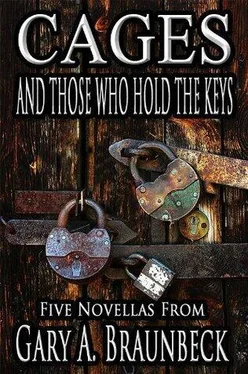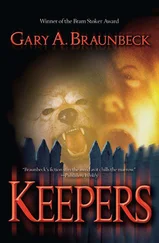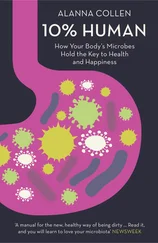She did, then kissed him good-night again, and went back to the darkness of the living room, where she sat on the sofa and listened for a while before falling asleep again, hoping that Grampa would feel better on the morningside.
When she woke up there was Mom, holding Grampa’s head in her lap, rocking back and forth, stroking his hair and crying. “Yes, that’s it...go to sleep, shh, that’s it, you rest now. You rest....”
Alan came over and hugged Marian. They stayed like that until Mom looked up and saw them and told them to come over and say good-bye to Grampa. Marian was suddenly afraid of the thing that mom was holding in her arms. It wasn’t Grampa. It didn’t even look like a human being.
She pulled away from her brother and saw that some of Grampa’s blood was still on her fingers.
It took her forever to get that hand clean.
5
Press seam allowances toward the darker fabric. Cut apart in pairs. The squares are in their proper color placement and ready for sewing. Place the first pairs right sides together and sew into four patches.
* * *
Alan pressed the top of his baseball cap to make sure it was still in place, then reached into one of his pants pockets and removed the stone bottle. “When Dad came home that night Grampa had both of us cut our thumbs and put some of our blood into this bottle, along with his. Then he gave it to Dad to keep until it would be time to pass it on to me.” He shrugged. “Guess it was some kind of Irish thing, some legend that our great-great-grandfather brought with him when he came to the States.”
“What are you supposed to do with it?”
Alan shook his head. “I can’t tell you yet.” He lifted the bottle into the light, slowly turning it from side to side, admiring it. “There’s something like twelve generations’ worth of Quinlan-men’s blood in here.” He looked straight at her.
“You’re now the only Quinlan woman left who can willingly carry on the family’s bloodline, so it’s your time now.”
Of all the things that raced through her mind at that moment, Marian found herself focusing on one word: willingly.
Alan took hold of her arms and pulled her to her feet. Jack reached up and—like something out of a cartoon or a Washington Irving story—removed his head from his shoulders and held it in front of him, his twig-fingers grasping the stem and removing it from the top of his head.
“Not yet,” said Alan to Jack as he took hold of Marian’s injured wrist, removed the dressing, and pushed on her wound until it burst open, dripping blood into the stone bottle.
Jack guided his head under the flow, trying to ignite his flame with Marian’s blood.
“ Stop it ,” she said through clenched teeth, wriggling against her brother’s grip but he was stronger than she remembered. He increased the pressure on her arm, pulling it toward the pumpkin while Jack loomed closer, his glow dimming, his form somehow larger and more powerful.
“We need to do it this way,” said Alan. “Just a little more blood, please.”
“Jack Pumpkinhead’s lonely, hon,” said the thing holding its own pumpkin head. “I want our family together again.”
Marian took a deep breath, twisting her wrist as some of her blood slopped into the jack-o’-lantern, then kicked back, the heel of her shoe connecting solidly with Alan’s shin. He howled and released her and Marian made a beeline for the back door because there was no way in hell she’d make it past both of them to the front door. Ignoring Alan’s calling her name, she
made her way into the kitchen and toward the back porch when she was struck in the face by a tree limb and fell backward against the sink counter.
Jack Pumpkinhead help to right her, then stroked her hair. “I’m sorry,” he said. “I didn’t mean to hurt you like that, but you just have to understand.”
Alan was next to her now. “Look, Sis, I don’t mean to go all Sleepy Hollow on you or anything, but you need to understand that...I’m sick. Just like Dad and Grampa and every other man in the Quinlan line going back for...I don’t know how long.” Her face was throbbing and it hurt too much to move. “Wh-what’s wrong?” “Colon cancer. It runs in the men in the family.” “Have you seen a doctor?” “No need to.”
“Then h-how do you know ?”
“The man I killed last night came here and told me.”
Marian felt her shoulders tense.
“It’ll all make sense soon,” he said, and kissed her cheek. For some reason Marian then remembered that both Grandma, Grampa, Mom, and Dad had all died in this house, and all were buried in the Quinlan area of Cedar Hill Cemetery, along with their direct and distant ancestors.
Alan looked at the blood on his fingertips—whether it was his blood, Marian’s, or some of that from the bottle, there was no way to tell. He turned toward one of the upper cupboards and began drawing faces on them. “I know,” he said, “that there’s nothing we can do about the dying, you’re right there. But there is something we can do about the part that comes after the dying, I found that out last night.” He finished the first face— it looked a lot like Grampa’s— then started another. “I suspected for a long while that there might be ways to do it, I even tried a few— but I imagine Laura or Boots told you all about that.”
Marian offered no response. There was no need.
“Okay,” he said. “The first thing you’ve got to ask yourself is this: what kind of tapestry, quilt, whatever, are you supposed to offer up to the Divine Art Critic when you reach the great Gates? Answer: a beautiful one. Because if it’s not beautiful, that means it’s not finished.” He stopped drawing Mom’s face and leaned toward Marian. “But what happens if— regardless of how much you try to make it otherwise— your tapestry doesn’t turn out to be so beautiful? What happens when you offer it up after death and the big Somebody shakes Its omnipotent head. ‘But it’s the best I can do!’ you cry. ‘I really tried, but I just didn’t have all that much nice stuff to work with!’ What happens then? Easy; you and your tapestry are thrown out to wander around all-blessed Night.” “I love you, Alan, but you’re not making sense.” “Stay with me, Sis, you always were the best listener in this house.” Marian stared. “Please let me go, Alan.”
He wasn’t listening. “Families talk about ‘the ties that bind’ a lot, you ever notice that? You know how that phrase originated? From Story-Quilt makers. I kid you not. See, there’s a method of quilting called ‘tessellation,’ which means ‘to form into or adorn with mosaic, a careful juxtaposition of elements into a final, coherent pattern.’ Since the quilt-makers had to employ endless tessellations in order to join the various patches together in order to form the story of their family, the threads they used were referred to as the ‘ties that bind.’ Don’t say I never taught you anything.
“Well, care to guess what those ‘ties’ are in our family, Sis? Love? Loyalty? Personal integrity? Think about. What is it, above all else, that ties you to your family?”
Marian looked down at her legs; they were shaking. She looked at the bloody faces on the cupboards; they were drying. She looked in her brother’s eyes; they told her nothing.
“I don’t know,” she finally said.
“Guilt,” replied Alan. “Guilt is what ties us all together, whether we admit it or not. Oh, sure, it’s easy to dismiss that idea. ‘I do it because I love you.’ ‘I do it because she’s been so good to me.’ ‘ I don’t care how sick or senile he is, I’m going to see him because I love him.’”
Читать дальше












